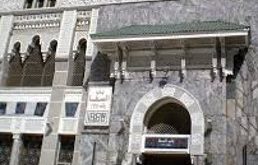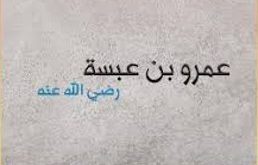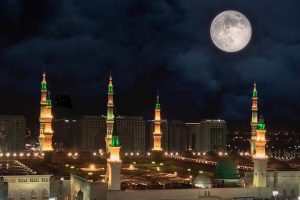At the break of dawn on Monday the 8th of Rabi Ul-Awwal, corresponding to April 570 A.D., in the Holy city of Makkah Mukarramah, in the house of Abu Taalib, the greatest of mankind, the leader of the progeny of Aadam, Muhammad Mustafa (Sallallahu Alaihi Wasallam) entered this world.
It is famously recorded in the books of history that the birth of Rasulullah (Sallallahu Alaihi Wasallam) occurred on the 12th of Rabi Ul-Awwal. However, according to the most preferred view of the Muhadditheen and Historians, Rasulullah (Sallallahu Alaihi Wasallam) was born on the 8th of Rabi Ul-Awwal.[1]
THE EVENTS THAT UNFOLDED AT THE TIME OF THE BIRTH OF NABI (SALLALLAHU ALAIHI WASALLAM):
THE EAST AND WEST BECOME ILLUMINATED
The mother of Nabi (Sallallahu Alaihi Wasallam), Aamina bintu Wahb mentioned: “At the time of the birth of Nabi (Sallallahu Alaihi Wasallam), I witnessed a light emerge with him as he separated from my womb, which illuminated the entire expanse between the east and west. After being placed on the ground, I saw him fall in prostration. He then took a handful of sand and looked up raising his shahaadah (index) finger towards the sky.”[2]
In some narrations, it is stated that Hadhrat Aamina says: “When I looked at the light which had emerged from within me at the time of the birth of Rasulullah (Sallallahu Alaihi Wasallam), I noticed that rays of Noor (light) were streaming from the face of Nabi (Sallallahu Alaihi Wasallam) and a unique fragrance was emanating from his blessed body.”[3]
Rasulullah’s (Sallallahu Alaihi Wasallam) raising his shahaadah (index) finger towards the sky at the time of his birth was in expression of tauheed (oneness of Allah Ta’aala) and ultimate submission to the Lord of the worlds.
THE ILLUMINATION OF THE CASTLES OF SYRIA
Irbaadh ibnu Saariya (Radiallahu Anhu) narrates that when Nabi (Sallallahu Alaihi Wasallam) was born his mother saw a light, which illuminated the palaces of Syria. Another narration states that the castles of Busra (a city in Syria) were illuminated.[4]
The palaces of Syria becoming illuminated with noor at the birth of Nabi (Sallallahu Alaihi Wasallam) was, in actual fact, an indication that Syria will be conquered by the Muslims and become the centre of hidaayah(guidance). Hence, it was witnessed thereafter that the regions extending from Makkah Mukarramah to Syria were conquered by the Muslims in the very lifetime of Nabi (Sallallahu Alaihi Wasallam). Some Ulama explain that from amongst the places that became radiant with light, in particular, were the palaces of Busra (a city in Syria). The apparent reason for this is that from all the regions of Syria, Busra was the very first Syrian city to be conquered and blessed with the radiance of prophethood and spiritual guidance.
Ka’b Ahbaar narrates that the following distinct signs of Nabi (Sallallahu Alaihi Wasallam) have been mentioned in the previous scriptures:
“Muhammad, the Messenger of Allah will be born in Makkah Mukarramah, migrate to Yathrib (Madinah Munawwarah) and his reign will extend over Shaam (Syria).”[5]
AN UNSEEN VOICE
Hadhrat Abdur Rahman ibnu ‘Auf (Radiallahu Anhu) narrates from his mother, Shifa, who mentioned, “When Nabi (Sallallahu Alaihi Wasallam) was born I took him into my arms, and thereafter he began to cry. I then heard a voice saying, ‘May Allah have mercy on you.’ I then saw the entire expanse between the east and the west illuminate to such an extent that some of the palaces of Rome became visible to me. Thereafter I fed Nabi (Sallallahu Alaihi Wasallam) milk and laid him down. Not long after, a feeling of awe overcame me and I fell unconscious. In that state, I heard a voice call out, ‘Where has he been taken to?’ Another voice answered, ‘To the east.’” Shifa went further on to say, “Though I did not quite understand the implication of this incident at that time, its magnitude remained in my heart. Hence, when prophethood was conferred upon Nabi (Sallallahu Alaihi Wasallam) I was amongst the first people to embrace Islam.”[6]
NOTE: Shifa is not recorded to be amongst the foster mothers of Nabi (Sallallahu Alaihi Wasallam). Therefore, the Ulama explain that perhaps the milk she fed him was from his own mother.
THE HOUSE OF NABI (SALLALLAHU ALAIHI WASALLAM) FILLED WITH NOOR AND THE BOWING OF THE STARS
Fatimah bintu Abdillah (the mother of Uthmaan ibnu Abil ‘Aas) relates: “I was with Aamina when Nabi (Sallallahu Alaihi Wasallam) was born. I observed the entire house filled with noor and the stars in the sky were drawing close to the home of Nabi (Sallallahu Alaihi Wasallam), to such an extent that I feared that the stars would fall on me.”[7]
NOTE: The bowing of the stars and their drawing closer to the earth was an indication that soon the darkness of kufr (disbelief) and shirk would disappear and the earth will be illuminated with divine light and guidance. As Allah Ta’aala says in the Holy Qur’aan:
“Indeed a light of guidance and a clear book has come to you from Allah, by means of which Allah guides the one who seeks His pleasure and removes him from darkness (kufr) to light (imaan) by His will”
SPEECH AFTER BIRTH
Haafiz ibnu Hajar states in Fath ul-Baari that it is reported in the Siyar of Al-Waaqidi that Nabi (Sallallahu Alaihi Wasallam) spoke not long after his birth.[8]
THE OUTCRY OF THE JEWS
Hadhrat Hassaan ibnu Thaabit (Radiallahu Anhu) reports: “I was a lad of seven or eight years, when one morning, I heard a Jew call out, “O gathering of Jews assemble together.” On assembling, they asked, “What is the matter? Why have you assembled us here?”He replied, “The star which was commanded to rise at the birth of Ahmad has appeared.”[9]
Ya’qub ibnu Sufyaan reports from Hadhrat Ayeshah (Radiallahu Anha): “On the night of the birth of Rasulullah (Sallallahu Alahi Wasallam) a Jew who had come to Makkah Mukarramah on a business mission enquired from the Quraish whether a child was born that night. The Quraish expressed their ignorance regarding the matter. The Jew then insisted that an enquiry be carried out. He thereupon informed them that in accordance to the Holy Scriptures a child was to be born that night. He will be the final Prophet of this ummah and the sign of his prophethood is that the seal of prophethood will be visible between his shoulders. Upon investigation, the Quraish discovered that a child was born in the home of Abdullah ibnu Abdil-Muttalib. The Jew pleaded to be taken to see the child. No sooner did his sight fell upon the seal of prophethood (between the mubaarak shoulders of Rasullullah (Sallallahu Alaihi Wasallam)) he fell unconscious. After regaining consciousness, he cried out: “O people of Quraish! By Allah! Prophethood has vanished from the Bani Israaeel! This infant will wage war against you and overpower you, and the news of his victory will spread rapidly from east to west.”[10]
NABI (SALLALLAHU ALAIHI WASALLAM) BEING BORN IN A STATE OF EXTREME PURITY AND CLEANLINESS
Is-haaq ibnu Abdillah reports that the mother of Nabi (Sallallahu Alaihi Wasallam), Aaminah said that when Nabi (Sallallahu Alaihi Wasallam) was born, he was extremely clean and pure. There was no trace of any impurity upon his blessed body.[11]
LESSONS
1. Undoubtedly, the birth of Nabi (Sallallahu Alaihi Wasallam) was a blessing unto mankind. Similarly, the miraculous way in which Rasulullah (Sallallahu Alaihi Wasallam) entered this world, as well as the divine signs which unfolded prior to the auspicious birth, were all blessings for humanity until the day of Qiyaamah. It should be borne in mind that though the majority of scholars prefer the 12th of Rabi ul Awwal to be the day the auspicious birth took place, however much contention and debate existed in the past regarding the exact date. In fact, ‘Allamah Qastalaani and ‘Allamah Zarqaani have enumerated seven conflicting opinions in regard to this issue.[12] Hence, the scholars unanimously agree that no conclusive verdict could be issued regarding this matter.
2. The birthday of Rasulullah (Sallallahu Alaihi Wasallam), despite its auspiciousness and blessing, was never celebrated during the mubaarak life of Rasulullah (Sallallahu Alaihi Wasallam). Similarly, the Sahaabah and Tabi’een never celebrated it after the demise of Rasulullah (Sallallahu Alaihi Wasallam). Furthermore, had the Sahaabah commemorated this event and earmarked it as a holy day, most certainly no differences would have existed and the exact date would have been unanimously agreed upon and preserved as are the occasions of Laylat ul Bara’ah and ‘Aashurah. Rasulullah (Sallallahu Alaihi Wasallam)has said,
من أحدث في أمرنا هذا ما ليس منه فهو رد (رواه البخارى 1/371)
“The one who innovates a practice in our Deen which is not part of Deen, his innovatory practice will be rejected (in the court of Allah Ta’aala)”.
In another Hadith, Rasulullah (Sallallahu Alaihi Wasallam) said,
كل بدعة ضلالة و كل ضلالة في النار (الجامع الصغير1/100)
“Every innovation is misguidance and misguidance leads to the fire of Jahannam”
3. Islam is a Deen which is based on the Qur’aan and Sunnah of Rasulullah (Sallallahu Alaihi Wasallam). Only that action will gain acceptance in the sight of Allah Ta’aala which completely conforms to the Qur’aan and Sunnah. Hence, any act which is considered as part of Deen but cannot be substantiated through the Qur’aan and Sunnah will be rejected and regarded as an innovation regardless of the sincere intentions one may have when carrying it out.
4. The mere coming of Rasulullah (Sallallahu Alaihi Wasallam) into this world was a means of great blessings and mercy. In fact, the entire life of Rasulullah (Sallallahu Alaihi Wasallam) was filled with blessings and mercy. Thus, the one who upholds every teaching of Rasulullah (Sallallahu Alaihi Wasallam) and inculcates the mubaarak sunnah of Rasulullah (Sallallahu Alaihi Wasallam) in every facet of his life will, In-sha Allah, also witness the blessings and mercy in his life through the barakah of practicing upon the Sunnah.
[1]Mawaahib volume 1 page 246
[2] Mawaahib volume 1 page 217, Nashr-ut-Teeb page 23
[3] Mawaahib volume 1 page 216
[4] Taareekh-ul-Islam volume 1 page 42
[5] Seerat-ul-Mustafaa volume 1 page 76, Mishkaaat ul-Masaabih page 514
[6] Mawaahib volume 1 page 224
[7] Mawaahib volume 1 page 218, Seerat-ul-Mustafaa volume 1 page 75
[8] Subul ul-Hudaa war-Rashaad page 349
[9] Mawaahib volume 1 page 225, Ar-Rawdh ul-Unf volume 2 page 143Mawaahib volume 1 page 225, Ar-Rawdh ul-Unf volume 2 page 143
[10] Mawaahib volume 1 page 226, Subul ul-Hudaa war-Rashaad page 339
[11] Tabaqaat ibnu Sa’d volume 1 page 82
[12] Mawaahib volume 1 page 246
 Ihyaaud Deen An Effort to Revive Deen in Totality
Ihyaaud Deen An Effort to Revive Deen in Totality



